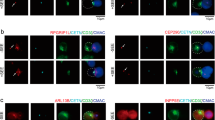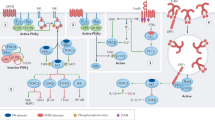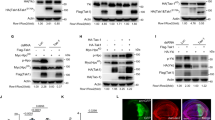Abstract
Mitogen-activated protein (MAP) kinases are essential regulators in immune responses1, and their activities are modulated by kinases and phosphatases. MAP kinase phosphatase (MKP) is a family of dual-specificity phosphatases whose function is evolutionarily conserved2,3. A number of mammalian MKPs have been identified so far2,3, but their specific physiological functions in negative regulation of MAP kinases have not been genetically defined. Here we examine innate and adaptive immune responses in the absence of MKP5. JNK activity was selectively increased in Mkp5 (also known as Dusp10)-deficient mouse cells. Mkp5-deficient cells produced greatly enhanced levels of pro-inflammatory cytokines during innate immune responses and exhibited greater T-cell activation than their wild-type counterparts. However, Mkp5-deficient T cells proliferated poorly upon activation, which resulted in increased resistance to experimental autoimmune encephalomyelitis. By contrast, Mkp5-deficient CD4+ and CD8+ effector T cells produced significantly increased levels of cytokines compared with wild-type cells, which led to much more robust and rapidly fatal immune responses to secondary infection with lymphocytic choriomeningitis virus. Therefore, MKP5 has a principal function in both innate and adaptive immune responses, and represents a novel target for therapeutic intervention of immune diseases.
This is a preview of subscription content, access via your institution
Access options
Subscribe to this journal
Receive 51 print issues and online access
$199.00 per year
only $3.90 per issue
Buy this article
- Purchase on Springer Link
- Instant access to full article PDF
Prices may be subject to local taxes which are calculated during checkout




Similar content being viewed by others
References
Dong, C., Davis, R. J. & Flavell, R. A. MAP kinases in the immune response. Annu. Rev. Immunol. 20, 55–72 (2002)
Camps, M., Nichols, A. & Arkinstall, S. Dual specificity phosphatases: a gene family for control of MAP kinase function. FASEB J. 14, 6–16 (2000)
Theodosiou, A. & Ashworth, A. MAP kinase phosphatases. Genome Biol. 3, 3009–3018 (2002)
Martin-Blanco, E. et al. puckered encodes a phosphatase that mediates a feedback loop regulating JNK activity during dorsal closure in Drosophila. Genes Dev. 12, 557–570 (1998)
Theodosiou, A., Smith, A., Gillieron, C., Arkinstall, S. & Ashworth, A. MKP5, a new member of the MAP kinase phosphatase family, which selectively dephosphorylates stress-activated kinases. Oncogene 18, 6981–6988 (1999)
Tanoue, T., Moriguchi, T. & Nishida, E. Molecular cloning and characterization of a novel dual specificity phosphatase, MKP-5. J. Biol. Chem. 274, 19949–19956 (1999)
Rincon, M., Derijard, B., Chow, C. W., Davis, R. J. & Flavell, R. A. Reprogramming the signalling requirement for AP-1 (activator protein-1) activation during differentiation of precursor CD4+ T-cells into effector Th1 and Th2 cells. Genes Funct. 1, 51–68 (1997)
Rincon, M. et al. Interferon-γ expression by Th1 effector T cells mediated by the p38 MAP kinase signaling pathway. EMBO J. 17, 2817–2829 (1998)
Dong, C. et al. Defective T cell differentiation in the absence of Jnk1. Science 282, 2092–2095 (1998)
Dong, C. et al. JNK is required for effector T-cell function but not for T-cell activation. Nature 405, 91–94 (2000)
Janeway, C. A. Jr & Medzhitov, R. Innate immune recognition. Annu. Rev. Immunol. 20, 197–216 (2002)
Takeuchi, O. et al. Differential roles of TLR2 and TLR4 in recognition of gram-negative and gram-positive bacterial cell wall components. Immunity 11, 443–451 (1999)
Alexopoulou, L., Holt, A. C., Medzhitov, R. & Flavell, R. A. Recognition of double-stranded RNA and activation of NF-κB by Toll-like receptor 3. Nature 413, 732–738 (2001)
Acknowledgements
We thank L. Evangelisti, C. Hughes and J. Stein for technical assistance; P. Leder for providing TC-1 ES cells; R. Alanis for his help with the Listeria infection experiment; A. Farr for his guidance in animal studies; and the entire Dong laboratory for their support and help. R.J.D. and R.A.F. are HHMI investigators, and C.D. is an Arthritis Investigator of the Arthritis Foundation.
Author information
Authors and Affiliations
Corresponding authors
Ethics declarations
Competing interests
The authors declare that they have no competing financial interests.
Supplementary information
Supplementary Figures
Here we showed that Mkp5 gene expression was regulated during immune activation. Overexpression of Mkp5 inhibited AP1 and AP1 mediated transcriptional activities. MKP5 is a negative regulator of cytokine production in the innate immune response and regulates T cell proliferation (PPT 370 kb)
Supplementary Methods
The methods described here include transient transfection, lucifierase assay, Toll-like receptor activation and Listeria infection, which are used to obtain the supplementary data shown in the figures (DOC 21 kb)
Rights and permissions
About this article
Cite this article
Zhang, Y., Blattman, J., Kennedy, N. et al. Regulation of innate and adaptive immune responses by MAP kinase phosphatase 5. Nature 430, 793–797 (2004). https://doi.org/10.1038/nature02764
Received:
Accepted:
Issue Date:
DOI: https://doi.org/10.1038/nature02764
This article is cited by
-
Immunotherapy targeting different immune compartments in combination with radiation therapy induces regression of resistant tumors
Nature Communications (2023)
-
Fueling sentinel node via reshaping cytotoxic T lymphocytes with a flex-patch for post-operative immuno-adjuvant therapy
Nature Communications (2023)
-
Lung fibrosis in autoimmune diseases and hypersensitivity: how to separate these from idiopathic pulmonary fibrosis
Rheumatology International (2022)
-
The addition of different oils in the diet regulates the expression of adipocytokine signaling genes in sheep longissimus dorsi muscle
Tropical Animal Health and Production (2022)
-
MicroRNA-92a Drives Th1 Responses in the Experimental Autoimmune Encephalomyelitis
Inflammation (2019)
Comments
By submitting a comment you agree to abide by our Terms and Community Guidelines. If you find something abusive or that does not comply with our terms or guidelines please flag it as inappropriate.



